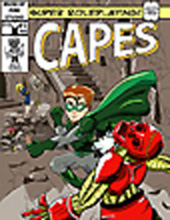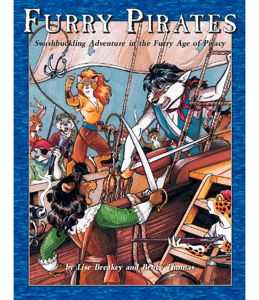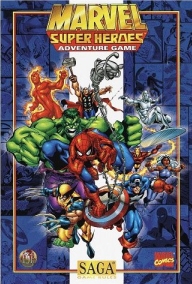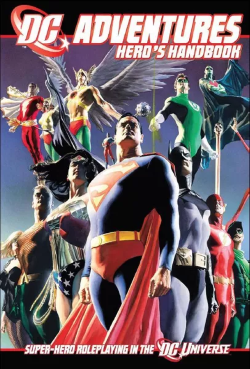 | |
| Designers | Tony Lower-Basch |
|---|---|
| Publishers | Muse of Fire Games |
| Publication | 2005 |
| Genres | Indie, Superhero |
| Systems | Custom |
Capes is a role-playing game by Tony Lower-Basch, independently published by Muse of Fire Games.
 | |
| Designers | Tony Lower-Basch |
|---|---|
| Publishers | Muse of Fire Games |
| Publication | 2005 |
| Genres | Indie, Superhero |
| Systems | Custom |
Capes is a role-playing game by Tony Lower-Basch, independently published by Muse of Fire Games.
Capes is one of the role-playing game systems published in the early 2000s to not require a gamemaster. [1] [2] [3] Capes was designed with the question in mind of whether 'Power is fun-but do you deserve it?' its game mechanics were designed for players to explore that that theme during play." [4] [5] Capes is a superhero storytelling game where all players play all of the characters in common to tell a comic book story rather than play the adventures of one character per player. [6]
It is a superhero role-playing game played in "scenes", in which players choose what character to play before each new scene. The game is a competitive storytelling game without a GM. Players create and play the villains who oppose other players' heroes.
Characters are generally co-owned, but controlled by one player at a time. Losers in conflicts can earn "story tokens" that can be used to influence the game, so it's sometimes beneficial to play a supervillain that gets beaten to get more story tokens.
The game also has a "gloating rule" that emulates situations where (for example) the villain can easily kill the heroes.
The only known module for the system is "Invasion from Earth Prime"
Jeremy Reaban for RPGnet reviewed the game and stated that "Capes is a very unusual new role-playing game from Muse of Fire Studio, available through the good folks at Indie Press Revolution. At first glance, it's a super-hero game, but in reality, it's almost a completely different sort of role-playing game. Role-playing games generally separate the game part from the role-playing. Capes actually makes a game out of the role-playing itself." [7]
The reviewer from the online second volume of Pyramid said that "In this era of thick and heavy superhero rulebooks, a slim little volume like Capes seems downright casual and cute. Don't be fooled. Capes offers a challenge unlike any in the comic book gaming niche, one which some players will take up with glee." [8]
The reviewer from superherorpgs.com said that "For players who value role-playing over 'roll-playing,' Capes offers a fresh alternative to the glut of superhero games already on the market. Longtime players accustomed to stringent rules and tables may have some initial difficulty adjusting to the open-ended gameplay, but first-time gamers should adapt quickly. While most superhero role-playing sessions are considered disappointing if the good guys lose, Capes allows you to win regardless of who comes out on top." [9]
Capes was nominated for Best Game and Best Rules at the 2005 ENnie Awards. [10] [11]

Fudge is a generic role-playing game system for use in freeform role-playing games. The name "FUDGE" was once an acronym for Freeform Universal DonatedGaming Engine and, though the acronym has since been dropped, that phrase remains a good summation of the game's design goals. Fudge has been nominated for an Origins Award for Best Role-Playing Game System for the Deryni Adventure Game.

Villains and Vigilantes is a superhero-themed role-playing game which competed primarily with Champions and Superworld in the early to mid-1980s.

Champions is a role-playing game published by Hero Games designed to simulate a superhero comic book world. It was originally created by George MacDonald and Steve Peterson in collaboration with Rob Bell, Bruce Harlick and Ray Greer. The latest edition of the game uses the sixth edition of the Hero System, as revised by Steve Long, and was written by Aaron Allston. It was released in early 2010.

Heroes Unlimited is a superhero role-playing game written by Kevin Siembieda and first published by Palladium Books in 1984. The game is based upon the Palladium Books Megaversal system and is compatible with other games that use the Palladium system.
A generic or universalrole-playing game system is a role-playing game system designed to be independent of setting and genre. Its rules should, in theory, work the same way for any setting, world, environment or genre in which one would want to play.

Mutants & Masterminds is a superhero role-playing game written by Steve Kenson and published by Green Ronin Publishing based on a variant of the d20 System by Wizards of the Coast. The game system is designed to allow players to create virtually any type of hero or villain desired.

Living campaigns, or shared campaigns, are a gaming format within the table-top role-playing game community that provide the opportunity for play by an extended community within a shared universe. In contrast to traditional isolated role-playing games, living campaigns allow and encourage players to develop characters that can be played at games run by many different game masters, but which share a game world and campaign setting, as well as a plot line that is overseen by a central core of professional or volunteer editors and contributors. Many living campaigns serve a dual role of providing a creative outlet for highly involved volunteer contributors while also serving as a marketing tool for the publisher of the game system that is the focus of the living campaign. While the earliest living campaigns were run by the now defunct RPGA, many groups around the world run active living campaigns which are independent or sponsored by other publishers.

Omlevex is a superhero role-playing game supplement published by Z-Man Games and Spectrum Games. The game mechanics are compatible with Champions, Silver Age Sentinels, and Mutants & Masterminds.

My Life with Master is an independently published role-playing game written by Paul Czege and published by Half Meme Press . My Life with Master is a game about role-playing the servants or minions of an evil Master or Mistress. The game won several awards, and reviewers recognized it as well-written.

Furry Pirates is an anthropomorphic, historical fantasy, pen-and-paper role-playing game published by Atlas Games. It is set in a parallel universe, reminiscent of 17th-century Earth. The game was written by Lise Breakey, designed by Bruce Thomas, and illustrated by Terrie Smith and Eric Hotz.

The Marvel Super Heroes Adventure Game is a role-playing game published by TSR, Inc. that uses the SAGA System and features characters published by Marvel Comics. It should not be confused with the earlier Marvel Super Heroes Game, also published by TSR, the later Marvel Universe Roleplaying Game, published by Marvel itself, or Marvel Heroic Roleplaying, published by Margaret Weis Productions.

Kobolds Ate My Baby! is an independently published role-playing game from 9th Level Games, a small-press publisher and designer of humorous role-playing games (RPGs) based in Pennsylvania. The name is a derivative reference to the Azaria Chamberlain disappearance and the famous misquote, "A dingo ate my baby!" The Super Deluxx Edition was still designed by 9th Level Games but is published by Dork Storm Press.

Pantheon and other Roleplaying Games is a 24-page book that includes five self-contained role-playing games for 3-6 players and designed to be completed in 1–2 hours.

Capes, Cowls and Villains Foul is a pen and paper roleplaying game about comic book style superheroes and their adventures, developed and published by Parsons, Kansas-based Spectrum Games. It officially debuted in the form of an illustrated 13-page PDF document released for free, called the Quickstart Preview in 2010. A full rulebook was released in 2012. It was written by Barak Blackburn, and uses a significantly modified version of a rules system that was first introduced in Cartoon Action Hour: Season 2 in late 2008.

DC Adventures is a superhero role-playing game published by Green Ronin Publishing in 2010 that is set in the DC Comics superhero universe. It uses the same game system as Green Ronin's third edition of Mutants & Masterminds.

Sentinels of the Multiverse is a cooperative card game published by Greater Than Games and released at Gen Con 2011. Players control a team of comic book-style heroes battling a villain. Each player controls one or more heroes, while a villain and environment deck each run themselves. A given game includes 3 to 5 heroes, 1 villain and 1 environment, which can be mixed and matched to create a number of different scenarios. The core game comes with 10 heroes, 4 villains, and 4 environments. The board game has also been made into a video game.

Dragon Ball Z: The Anime Adventure Game is a role-playing game published by R. Talsorian Games in 1999 that is based on the Dragon Ball Z anime.
Robert Hatch is a game designer and writer who developed key role-playing game releases for White Wolf Publishing from 1993 to 2001. He is known primarily for three games he co-created: the science fiction game Trinity, the super-hero game Aberrant (1999), and the epic fantasy RPG Exalted (2001).

Allies is a 1993 role-playing game supplement published by Hero Games for Champions.

Champions Universe is a supplement published by Hero Games/Iron Crown Enterprises (I.C.E.) in 1992 for the superhero role-playing game Champions.